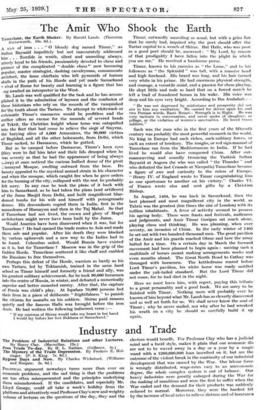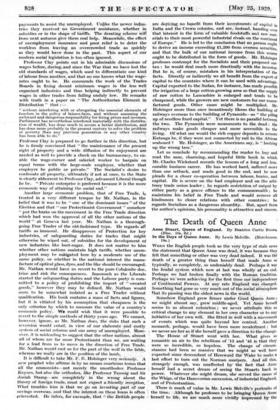Industry and Trade
POLITICAL argument nowadays turns more than ever on economic problems, and the sad thing is that the problems are too often misrepresented and the principles underlying them misunderstood. If the candidates, and especially Mr. Lloyd George, could all take a week's holiday from the platform and attentively -read ProfessorClay's new and weighty volume of lectures on the questions of the day,. they and the electors would benefit. For Professor Clay who has a judicial mind and a lucid style, makes it plain that our economic ills are not to be waved away in a day or a year by a magic wand with a £200,000,000 loan inscribed on it, but are the outcome of the violent break in the continuity of our industrial development that was caused by the War. Our labour force is wrongly distributed, wage-rates vary to an uneconomic degree, the whole complex system is out of balance. Our heavy industries were greatly enlarged during the War for the making of munitions and were the first to suffer when the War ended and the demand for their products was suddenly reduced to normal. Moreover, they were the hardest hit . by the increase of local rates to relieve distress and of insurance
payments to assist the unemployed. Unlike the newer indus- tries they received no Goveriiment assistance, whether in subsidies or in the shape of tariffs. The derating scheme Will from next autumn give them real help. Meanwhile, the effect of unemployment insurance and poor relief is to deter the workless from leaving an overcrowded trade as quickly as they would have done in the past. This aspect of . our
modern social legislation is too often ignored. . •
Professor Clay points out in his admirable discussions of wages before, during, and since the War that we have lost the old standards of wages, which used to differentiate one kind of labour from another, and that no one knows what the wage- rates ought to be. He commends the work of the Trades hoards in fixing decent minimum wages in the less well organized industries and thus helping indirectly to prevent wages in other trades from falling unduly low. He remarks with truth in a paper on " The Authoritarian Element in Distribution " that :-
" without interfering with or abrogating the essential elements of freedom in the policy of laissez-faire, and without assuming the awkward and dangerous responsibility for fixing prices and incomes, Parliament has nevertheless interfered materially with the distribu- tion of wealth, has done much to secure a better distribution, and has done more probably in the present century to solve the problem of poverty than any previous generation or any other country
has been able to do. 1 -_
Professor Clay is prepared to go further in this direction, but he is firmly convinced that " the maintenance of the present right of property and a wide diffusion of its enjoyment are needed as well to provide a check on the bureaucracy, to en- able the wage-earner and salaried worker to bargain' on equal terms with the large-scale employer, whether that employer be public or' private." The Socialist's desire to confiscate all property, ultimately if not at once, to the State is clearly abhorrent to Professor Clay, advanced Liberal though he be. " Private enterprise is preferred because it is the more economic way of attaining the social end."
Another large economic problem, that of Free Trade, in treated in a very different temper by Mr. Nathan, in the belief that it was to be " one of the dominant issues " of the Election and that " our Protectionist Government somehow " put the brake on the movement in the Free Trade direction which had won the approval of all the other nations of the world " at Geneva last year. Mr. Nathan is a thorough- going Free Trader of the old-fashioned type. He regards all tariffs as immoral. He disapproves of Protection for key industries, of safeguarding duties for trades that might otherwise be wiped out, of subsidies for the development of new industries like beet-sugar. It does not matter to him whether other nations maintain high tariffs, whether unem- ployment may be mitigated here by a moderate use of the same policy, or whether in the national interest the manu- facture of optical glass, dyes, and the like should be encouraged. Mr. Nathan would have us revert to the pure Cobdenite doe_ trine and risk the consequences. Inasmuch as the Liberals started the safeguarding duties and the. Labour party is com- mitted to a policy of prohibiting the import of "sweated goods," however they may be defined, Mr. Nathan would seem to be somewhat isolated as a Free Trader without qualification. His boOk contains a mass of facts and figures, but it is vitiated by his assumption that cheapness is the only criterion by which to measure the value of a country's economic policy-. We could wish that it were possible to revert to the simple methods of thirty years ago. We cannot, however; ignore, as Mr. Nathan does, the risks that such a reversion would entail, in view of our elaborate and costly system of social reforms and our army of unemiloyed. More- over, it is misleading to suggest that the other nations, almost all of whom are far more Protectionist than we, are waiting for a lead from us to move in the direction of- Free Trade. Mr. Nathan would cast us for the part of the wolf in the fable, whereas we-really are in the position of the lamb, , •
It is difficult to take Mr. F. E. Holsinger very seriously. A new prophet who affirms in by no means courteous terms that all the economists—not merely the unorthodox Professor Keynes, but also the orthodox, like Professor Taussig and Sir Josiah Stamp—ire completely" in the wrong about the theory of foreign trade, must not expect a friendly reception, What troubles him is that we go on investing -part of our savings overseas, and that the interest on these loans is often reinvested: -He infers, for exemple, that -"Abe British- people
are deriving. no benefit from their investments of capital in India and the Crown colonies, and are, instead, handing over that interest in the form of valuable foodstuffs ana raw mat- erials to their most powerful industrial rivals on the continent of Europe." He is led to the conclusion that no Ferfoon ought to derive an income exceeding £1,200 from oversee securities, and that the bulk of our national income from this source ought to be distributed- in the form of goods. Mr. Holsinger professes contempt for the Socialists and their proposed sur- tax : he would deal much more drastically with the investor, But he is, of course, mistaken in his interpretation of the facts. Directly or indirectly we all benefit from the export of capital to the countries where it can be used with advantage. Capital exported to the Sudan, for instance, has made possible the irrigation of a large cotton-growing area so that the supply of raw cotton to Lancashire is enlarged and tends to be cheapened, while the growers are new customers for our manu- factured goods. Other cases might be multiplied. Mr. Holsinger more than once incautiously likens the building of railways overseas to the building of Pyramids—as " the piling up of needless fixed capital." Yet there is no parallel between the two. The Pyramids were monuments to the dead : the railways make goods cheaper and more accessible to the living. Of what use would the rich copper deposits in remote Katanga be, if they were not connected by rail to the African seaboard ? Mr. Holsinger, as. the Americans say, is " barking up the wrong tree." .
. Let us conclude by recommending the reader to buy and read the sane, charming, and hopeful little book in which Mr. Charles Wicksteed records the lessons of a long and hon. ourable business career. He has worked hard, suffered more than one setback, and made good in the end, and he now pleads for a_ closer co-operation between labour, brains, and capital. He is severe on the bad employer and on the arbi- trary trade union leader ; he regards restriction of output by either party as a grave offence to the commonwealth ; he maintains his belief in Free Trade and would remove all hindrances to closer relations with other countries ; he regards Socialism as a dangerous absurdity. But, apart from the author's opinions, his personality is attractive and sincere.









































 Previous page
Previous page